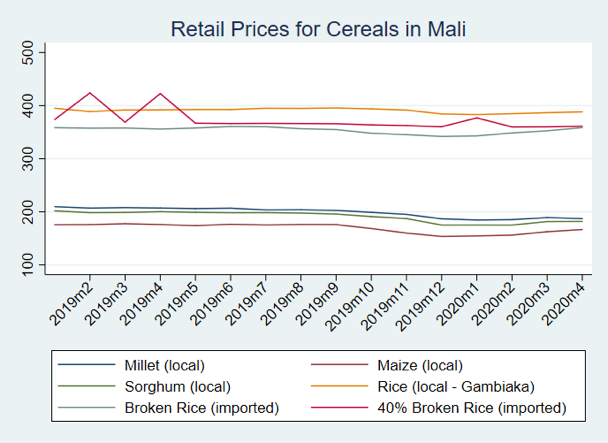In the aftermath of the official declaration of the first cases of COVID-19 by the Malian government on March 25, 2020, households have been suddenly confronted with sharp price increases for some staple foods, such as sugar, oil, and powdered milk. Prices of sanitary products, including face masks, gloves, and pump hand sanitizers have also skyrocketed. These increases have been felt by most households and, especially, by the poorest ones. Contrary to the above-mentioned foods, prices of cereals (millet, sorghum, maize and rice) have not significantly increased (so far). One month after the start of the pandemic, cereal prices have remained stable, as in a normal year. As seen in Figure 1, there was no major shock in the monthly average prices from January 2019 (pre-pandemic) to April 2020 (during pandemic).

Here are the main reasons, according to us, for this price stability. First of all, the high availability of grain stocks from wholesalers at the time of reporting of COVID-19 has played a key role in mitigating cereal price increases. Wholesalers use the months before Ramadan to stock to ensure they can meet the strong demand. The high supply means that there is no cereal shortage, and therefore, less pressure on prices. Amidst COVID-19, trade has continued and wholesalers have been able to replenish their stocks of imported rice. Secondly, the imposition of ceiling prices for key staple foods by the General Directorate of Trade, Consumption, and Competition (DGCCC) has also contributed to mitigate price increases. For instance, the retail price of imported rice is fixed at CFAF 350 per kg. Thirdly, the announcements made by the Malian government to purchase and donate 56 000 tons of cereals to the poor and reduce custom taxes have helped to reassured both consumers and suppliers. As a result, the expected price increases resulting from COVID-19 have so far been contained for key staple cereals (millet, sorghum, maize and rice).
Acknowledgment
Feed the Future Innovation Lab for Food Security Policy -Mali Food Security Policy Research Program/ Projet de Recherche sur les Politiques de Sécurité Alimentaire au Mali (PREPOSAM)



 Print
Print Email
Email